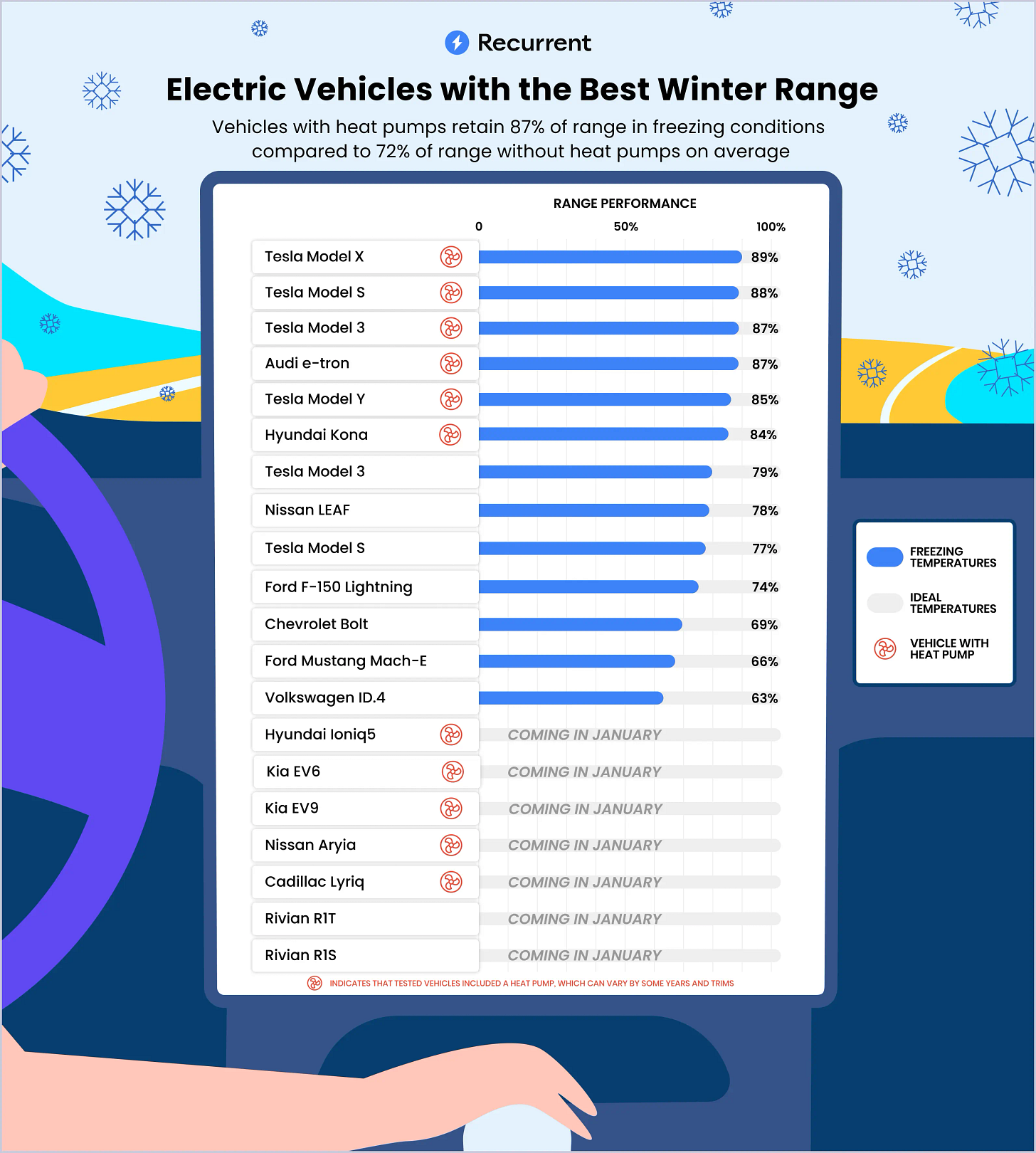Am I dumb to buy an EV if I live in a cold-weather climate?
EVs do lose efficiency in the cold — just like their gas-powered cousins. So, yes, EVs are just fine in the cold. Here’s why.
Now that the social networks know I care about electrified driving, they love to serve up provocative, baiting posts from folks who think EVs are part of the woke agenda. And one topic that comes up again and again is that electric cars just don’t work in the cold. Of course, with the onset of climate change, that may cease to be relevant, but, for now, we do have cold weather and snowstorms and those of us who reside in those areas need vehicles that can manage.
Many mistruths have some root in truth, so let’s be real: the earlier generation of electric vehicles didn’t do a great job of maintaining battery efficiency in cold temperatures. A U.S. Department of Energy study, using electric vehicles from the 2019-2020 model year, observed a reduction of efficiency of 41% in 20 degree Fahrenheit temperatures vs. 72 degrees. Gas powered counterparts, meanwhile, saw a reduction of 10% efficiency in those same cold temperatures. Not a great showing for Team Electrons!
But, like Timmy-channeling-Bobby-Dylan might sing, the times they are a-changin’, and EV technology continues to make leaps forward. Primarily, more and more models are available with an onboard heat pump, a device that heats the cabin without less strain on the batteries, leaving them more available to power the car. (For contrast, your gas car produces a ton of excess and otherwise wasted heat through the process of internal combustion, and it turns that heat into cabin heat.) If you want to learn more about how it all works, there’s a good explainer here.
What this boils down to is smart shopping. Just like you wouldn’t want to buy a rear-wheel drive sports car to daily-drive in a cold, snowy climate, you aren’t going to want an EV in cold weather unless it’s got a heat pump. Thankfully, the nice folks at Recurrent are maintaining a list of EVs equipped with heat pumps. It’s a bit tricky to navigate, as some manufacturers offer heat pumps as an option while others offer it as standard equipment. Sometimes it’s included with a specific trim package. Sometimes, you’ll ask a salesperson and they’ll have absolutely no idea what you’re talking about.
And as you’ll see from this chart, also from Recurrent, the heat pump makes a dramatic difference in cold weather battery performance. The top six cars in their winter testing all come equipped with a heat pump, and their data says that EVs with a heat pump average 87% range in freezing conditions, which is just about on par with their gas counterparts.
A couple of years ago, there was a major snowstorm in Virginia that paralyzed I-95, leaving folks stranded in their vehicles for as many as 24 hours, and a columnist in The Washington Post used this news item to question the viability of EVs in real world situations. He highlighted an anecdote of a trucker offering blankets to a Tesla driver who was worried about running out of power in the cold with his kids. Who wouldn’t be scared in this situation? I’m a dad. I can relate.
Thing is, as Car and Driver discovered, EVs are just about as efficient keeping the cabin warm in “idle” as a gas car. Their test found that a Tesla Model 3 could maintain a cabin temperature of 65 degrees for 45.1 hours, just 6 hours less than a similar sized gas powered car. Oh, and their test used an older Model 3 that did not feature a heat pump, which is now standard on that vehicle. The moral of that snowstorm story: if you’re going out driving in a snowstorm, which you shouldn’t, make sure you have a full battery (or tank of the dinosaur juice).
Anyhow, with an efficient heat pump in your EV, you will be totally toasty all winter. You can also program the vehicle to know when you plan to leave the house and you’ll have a warm cabin and a pre-conditioned battery and powertrain, without any fumes filling up your garage. And, if you’re plugged into your home charger, there won’t be a drop of loss from your battery. (Another key reason to charge where you sleep, as I discussed earlier.)
That EV life, then — are we getting warmer?



